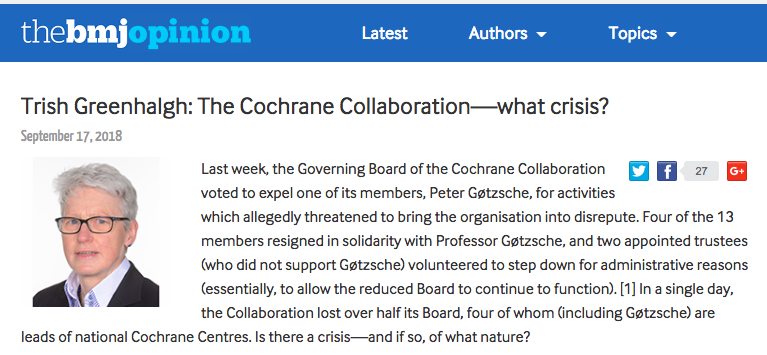
https://blogs.bmj.com/bmj/2018/09/17/trish-greenhalgh-the-cochrane-collaboration-what-crisis/
Trish Greenhalgh is an author to whom we have maximum respect for her methodological rigour, critical capacity and breadth of approaches. She has made an editorial comment about the Cochrane crisis which aims to be measured, complex and equidistant although what she does in reality is to defend the decision of the Cochrane Board to expel Peter Gøtzsche.
It argues the existence of an epistemic problem and another one of organizational governance that would have to be separated. In relation to the general epistemic problem, we agree with her that the methodology of biomedical science is loaded with values and judgments and, therefore, there is the possibility of disagreements and/or contradictory results in meta-analysis carried out on the same issue by different teams of researchers. As Stegenga reminds us, the methodology of evidence synthesis is malleable.
The problem, and this is something that Greenhalgh does not enter into, is that malleability does not produce random results, as would correspond to an epistemic bias, but disproportionately favorable to the products evaluated. Science has a biased malleability i.e. its consequences are not randomly distributed between positive and negative results. Greenhalgh accuses Peter Gøtzsche of being a method purist, that is to say, a kind of fundamentalist technocrat who ignores the value laden issues that are interwoven with the most technical but, at the same time, forgets that these valuation issues end up playing systematically in favor of powerful economic interests.
The diagnosis is good but the prognosis is bad. Dr Greenhalgh tells us: admit that discrepancies are inevitable but trust that science will eventually produce balanced knowledge. It alludes to an unproven capacity for self-regulation of science and its institutions which is what the annoying Peter Gøtzsche denounces: science is not working and Cochrane is not doing so either because it accepts the structural biases of the current biomedical knowledge management system in all its phases (production, synthesis, dissemination, application and regulation). Greenhalgh naively assumes that these structural influences do not affect his elegant theory of value controversies.
His second argument also catches our attention: if value disputes are inevitable, how do we resolve them? By driving out critics with the line defended by the organization? In other words, should controversies of value be tolerated only at the epistemic level but not at the organizational level? In our opinion, in every organization there coexist and interact two central levels that must be distinguished and must not be confused: the members of the same and the whole of the organization itself. This collective scope is provided with means, regulations and mechanisms that make effective the participation, agreements, decisions and actions. That is to say, the members of Cochrane in addition to being integral part and members of this organization, have individual right to the freedom to disagree, to opine and criticize publicly, to contradict methodologies and results of scientific and meta-scientific studies, to question opinions and agreements adopted by the direction of the organization. The quality and foundation of the critique must be evaluated in any case, by the rest of the members of the organization, by the specialist and professional researchers, by the scientific journals that publish the critiques, etc.
In short, the critical public statements that as members of the organization can make the scientists-researchers of Cochrane should not be submitted to any previous filter, institutional, political, economic or ideological, and much less have to be object of censorship, repression, inquisitorial persecution or exclusion. The independence and neutrality with respect to the powers and social interests of any type, is an inalienable value and criterion and a guarantee of quality, objectivity and rigor accepted in science, something that is very opposed to the criteria of being or not in agreement with certain institutional policies. Scientific organizations are neither companies nor political parties. It is a serious mistake to resolve any clumsiness or error in the forms that may have occurred on the part of Peter Gøtzsche through his expulsion: this decision is neither democratic nor respectful of the principles that should govern scientific institutions.
A few years ago in his fabulous article «Evidence based medicine: a movement in crisis?» Greenhalgh wrote:
«To support real evidence based medicine, and in particular to reassure policy makers, clinicians, and the public that research and the guidance derived from it can be trusted, the infrastructure for research and guideline development must show the highest standards of probity. Independent funding of national bodies for medical research is crucial.»
And she continued:
«Much progress has been made and lives have been saved through the systematic collation, synthesis, and application of high quality empirical evidence. However, evidence based medicine has not resolved the problems it set out to address (especially evidence biases and the hidden hand of vested interests), which have become subtler and harder to detect.»
We do not know what values have led Trisha Greenhalgh to write this closed defence of the status quo but we fear that either she is naïve, that we do not believe, or someone has asked her to help control the damage. Neither option will help improve the biomedical science and public deliberation processes needed to make scientific knowledge «reliable,» which is what she, like us, undoubtedly wants.
Trisha Greenhalgh skids
Editorial comentary by Abel Novoa. Chair of NoGracias


Abel,tienes que declarar tu conflicto de interés y que tienes una foto con Gotzsche.
Entrar en la categoría «groupie de» es un conflicto de interés ;)))
jaja la tenía..desde hace un par de años la tengo con Erviti, Laporte y Padilla que son más humanos. Abel Novoa